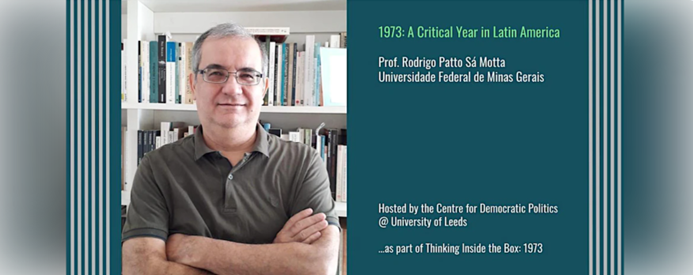Guest lecture summary | 1973: A Critical Year in Latin America

- Date
- Thursday 20 April 2023
On 20th April 2023, we invited Professor Rodrigo Patto Sá Motta from the Federal University of Minas Gerais to talk about the shape of democracy in Southern Cone Latin America. In the context of the fiftieth anniversary of the Chilean military coup d’etat of 1973, Rodrigo’s lecture focused in particular on the region’s experience of state terror under military-authoritarian regimes and the way their institutional legacies have shaped the nature of democracies today.
Rodrigo is a distinguished scholar in the field of Brazilian history, in particular the history of the Left, political and institutional history, and memory in relation to the country’s experience of the Cold War. He has taught at various institutions across Latin America, including Chile, Argentina, and Colombia, has held visiting positions in the USA, and is currently undertaking a professorship at the Department of War Studies at King’s College University of London. His work has also been translated into English, including On Guard Against the Red Menace: Anti-Communism in Brazil, published in 2020, and more recently, A Present Past: The Brazilian Military Dictatorship and the 1964 Coup, both published by Sussex Academic Press.
The lecture marked Rodrigo’s new direction of research, which comparatively analyses the objectives and interests that drove agents of authoritarianism and led certain social groups to support and sustain dictatorship in Latin America between the 1960s and 1980s. While acknowledging the material and ideological support these regimes provided one another, he notes different tools of repression as well as the varying impacts these had on longer-term regional and national histories. The aim of this comparative approach or interconnected reflection is not just to pinpoint the similarities and common tendencies that reinforce the role of the nation-state, but also to scrutinise some of the differences and singularities which hold clues to the region’s state of democracy today. His work is guided by two essential questions: why did the military leave their barracks to seize power in the 1960s and 1970s? And why did they receive the support of so many civilians, especially from the upper and middle strata?
Rodrigo’s response to these questions was complex, but ultimately challenged the narrative that the region’s military regimes were motivated predominantly by the question of political power. Economic motivations, too, are relevant, especially when we consider how the regimes mobilised authoritarian governance to facilitate economic restructuring, particularly in the direction of neoliberal reforms. But Rodrigo’s nuanced examination also reveals the undercurrent of internal disputes that led to some nations pursuing more clearly nationalist economic agendas that were disagreeable to their foreign allies, as well as the role that economic performance played in the regimes’ longevities. By looking to the role of civil society, Rodrigo emphasises, as he has elsewhere, the role of the ‘phantom’ communist revolutionary forces that were generated by the regimes and played on the cultural, financial, and moral fears of the middle classes and tapped into a localised historical tradition of anti-communism and anti-Marxism. Rodrigo’s final argument points to the role of the alleged fight against corruption in justifying and maintaining authoritarian rule.
The lecture ended on an optimistic note, crediting a number of political shifts that have arguably made it harder for authoritarian coups to take place and survive in Latin America. First, they have proven too risky and costly, largely with the lesson that authoritarianism comes with future penalties as recent decades have sentenced dozens of military and police officers for the human rights violations they carried out under the regimes. Second, would-be authoritarians have recognised that counting on the support of foreign powers is unreliable. Finally, leftwing sectors themselves have learned from the past, particularly in relation to how their actions in the past indeed strengthened right-wing groups.
As we contemplate the current conditions of democratic politics, as well as the institutions and socio-economic dimensions that underpin democracies, these lessons from this spatially and temporally distant past are crucial. Democratic regimes in Latin America remain frightfully unstable. In Brazil, a failure to establish a collective memory of the past has manifested in Cold War era rhetoric and dynamics returning to the foreground of political conflict. But far beyond this, recent years have shown the discursive power of alleged commitments to combating political corruption as well as the doors this opens to non-democratic forms of political rule. Likewise, Rodrigo’s reflections raise the question of the role of the hallucinatory internal enemy; we are presented with the possibility that ‘anti-wokeness’ has taken the place of anti-communism in the right wing and popular political imaginary to potentially dangerous effect.
Rodrigo’s research has been guided by the question of whether we can consider that democracy in the Southern Cone has reached some kind of stability. By looking at the multiple and mutually reinforcing structural and contextual elements that gave rise to this particular wave of authoritarianism, he has raised critical questions about the stability of democracy across the world today, and demonstrated the importance of historical and transnational perspectives in understanding our current political climate.
